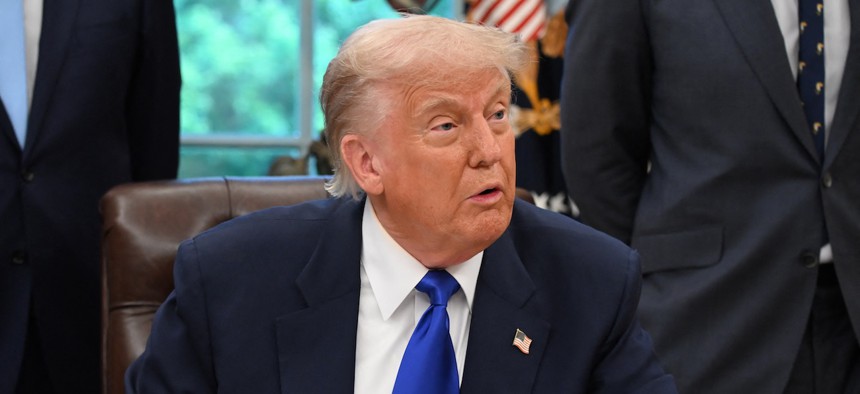
President Donald Trump speaks to the media while signing executive orders in the Oval Office on May 5, 2025. His latest EO is the latest effort to establish a tighter grip on the executive branch and its actions. Photo by ALEX WROBLEWSKI/AFP via Getty Images
Trump creates 'Schedule G' to add more political appointees to agencies top ranks
The new, non-career employees will serve in policy-making roles and add "horsepower" to carrying out the administration's agenda, White House says.
Updated July 18 at 2:09 p.m.
President Trump created another new category of federal employee on Thursday evening, issuing an executive order to expand the number of political appointees who do not require Senate confirmation and will serve in policy-making or policy-advocating roles.
While presidents can already tap an uncapped number of appointees to serve in Schedule C positions, Trump noted those individuals serve in more narrow confidential or policy-determining roles. The new positions will therefore fill a gap that currently exists in federal appointments, the White House said.
The order is the latest in Trump’s effort to establish a tighter grip on the executive branch and its actions. He has already created Schedule Policy/Career, formerly known as Schedule F, which is similarly defined to Schedule G but reserved for career civil servants. Agencies are in the process of determining who qualifies for conversion to Schedule Policy/Career and those employees will become easier to fire for any reason.
“President Trump believes creating non-career Schedule G positions will enhance government efficiency and accountability and improve services provided to taxpayers by increasing the horsepower for agency implementation of administration policy,” the White House said in a fact sheet accompanying the order.
Appointments to Schedule G positions are expected to lapse at the end of a presidential administration. The roles are particularly aimed at the Veterans Affairs Department and will go to applicants who prove to be suitable supporters of the president’s agenda. Agencies cannot take into consideration an applicant’s political affiliation.
“Schedule G employees will be hired to help faithfully implement the President’s policy agenda,” the White House said.
Max Stier, president of the Partnership for Public Service, said Schedule G would only make an "overly complicated system more confusing" and the Trump administration failed to engaged with experts, who would have said the new appointment category was creating redundancies that disempower the apolitical civil service. Adding more political appointees will mean that "effective, stable service delivery will suffer," he said.
“This new Schedule G classification is another misguided attempt by the administration to further politicize the federal workforce," Stier said. "A president already has the power to make more than 4,000 political appointments, far more than other democracies, most of which number their political appointees in the 10s."
The White House boasted that Schedule G’s creation is just the latest effort to deliver on Trump's "promise to dismantle the deep state and reclaim our government from Washington corruption.”
Trump tasked the Office of Personnel Management with establishing regulations to implement Schedule G. In April, OPM issued guidance that encouraged agencies to consider offering the maximum salary of $195,200 to attract Schedule C employees. It is not immediately clear if that pay cap will apply to Schedule G appointees. OPM’s guidance also removed career human resources staff from the process of vetting Schedule C appointees, onboarding them and setting their pay.
Don Moynihan, a professor at University of Michigan’s Ford School of Public Policy, said the executive order was the president’s latest effort to strip career experts of influence within federal agencies.
The order “opens space at top ranks of government for Trump loyalists as policymakers, with no limit on hires,” Moynihan said, adding it “continues [a] pattern of politicization.”
This story has been updated with additional comment.
Share your newstips with us:
Eric Katz: ekatz@govexec.com, Signal: erickatz.28
NEXT STORY: House sends bill to rescind billions for foreign aid and public media to the White House







